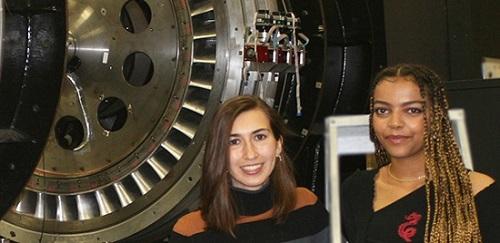The Fellowship, established in 1938 in honour of famed pilot and Zontian, Amelia Earhart, will enable Abigail and Sofia to invest in state-of-the-art equipment needed to conduct their PhD research.
Abigail’s research focus is on the impact of surface topography (roughness) on the aerodynamic performance of turbine blades – a contributing factor to the amount of specific fuel consumed by a gas-turbine aeroengine to generate thrust. Sofia’s focus is on the aerodynamic flow field of the fan stage in a turbofan engine experiencing ‘windmill’ condition – the point at which power to the engine is cut off during flight because of failure of or damage to the rotor blades, for example.
This highly sought-after $10,000 Fellowship, awarded by Zonta International, will also see both women present their research at international conferences and participate in specialised studies.
Abigail Berhane
Abigail is working in collaboration with Rolls-Royce on research that will have an impact on all stages of a gas turbine engine, from design and development through to life-cycle management.
“An improved understanding of the aerodynamic loss processes which contribute to the inefficiency of turbomachines is an important step in reducing the specific fuel consumption of gas-turbine aeroengines,” she said. “Approximately one third of the loss generated within an aeroengine turbine is associated with the aerodynamic friction or skin friction between the air flow and turbine blade surfaces. The skin friction is strongly dependent on the topography of the blade surface."
Abigail will study the impact of roughness on skin friction via a series of fundamental experimental investigations in a wind tunnel. The wind tunnel reproduces engine representative boundary layers in conjunction with computational simulations. Her research will utilise recent advances in additive layer manufacturing to rapidly recreate the complex surface topographies of aeroengine turbine blades for testing, alongside advances in computational simulations and data processing.
“A better understanding of how surface topography affects the development of the blade surface boundary layer is not only necessary for current designs, but crucial for the successful implementation of novel materials and manufacturing processes,” she added.
Sofia Medina Cassillas
Sofia is also working in collaboration with Rolls-Royce on research that will lead to the development of a low-order model tool that will quickly assess the fan rotational speed and drag at the windmill condition for different turbofan designs. Applied in industry, it will pave the way for less conservative designs with improved efficiency.
“Windmill condition is characterised by large flow separation and high drag. Identifying the complex aerodynamic flow field at windmill is particularly important in the case of future turbofan designs that have increasingly low fan pressure ratios, high bypass ratios and large fan diameters to reduce greenhouse gas emissions,” she said. “I will use a combination of experimental measurements in an engine-representative rig and computational fluid dynamics to characterise the windmill flow field. My investigations will include steady and unsteady flow effects, as well as the design of damaged fan blades in order to assess the differences in the aerodynamics for a set of representative damage cases.”
A spokesperson for Zonta International said: "We are excited to welcome them into our community of Amelia Earhart (AE) Fellows and look forward to following their contributions to the fields of aerospace engineering and space sciences."
Image (top): Sofia Medina Cassillas, left, and Abigail Berhane in the Whittle Lab.
Reproduced courtesy of University of Cambridge, Department of Engineering
